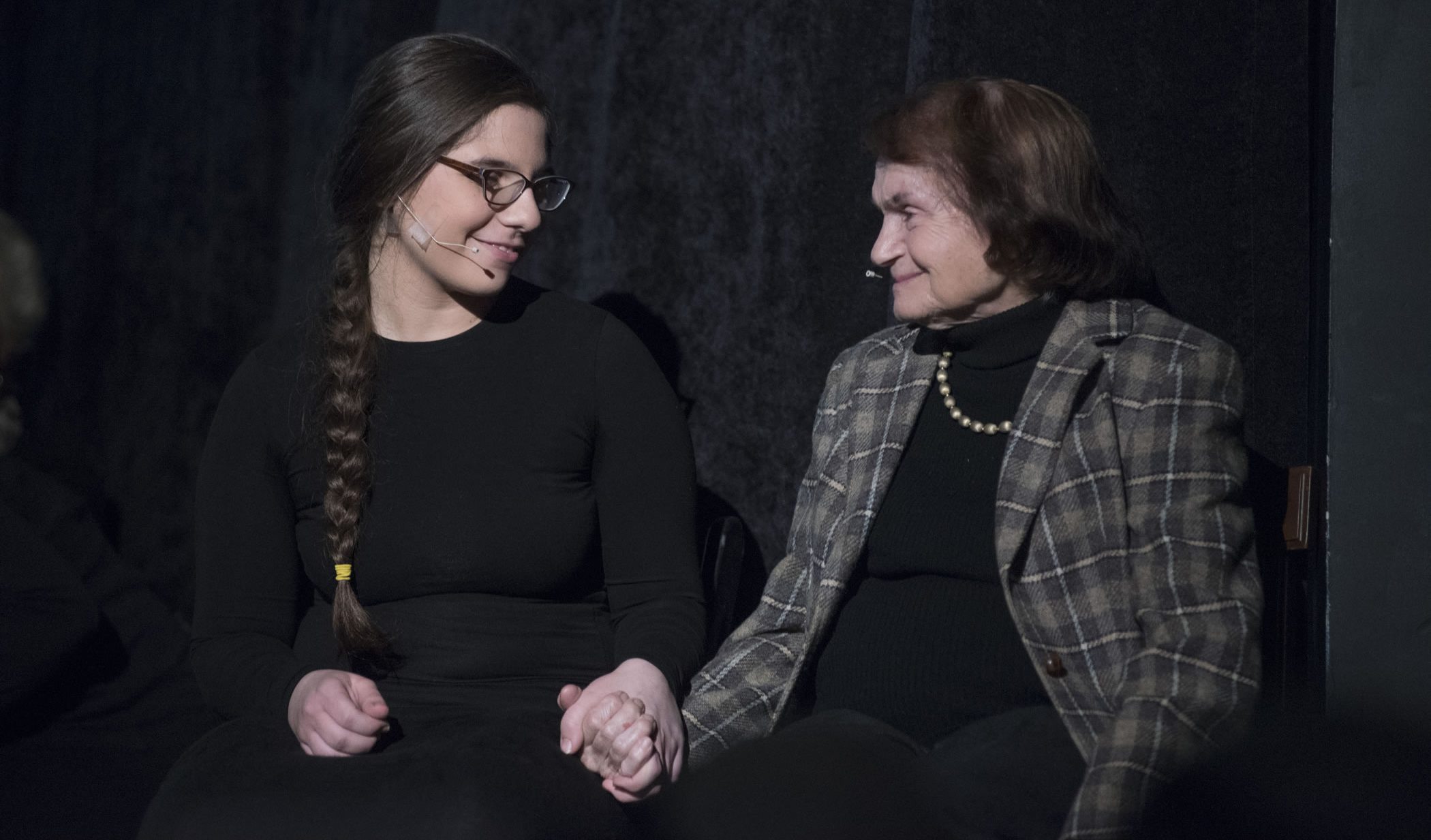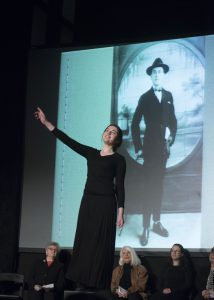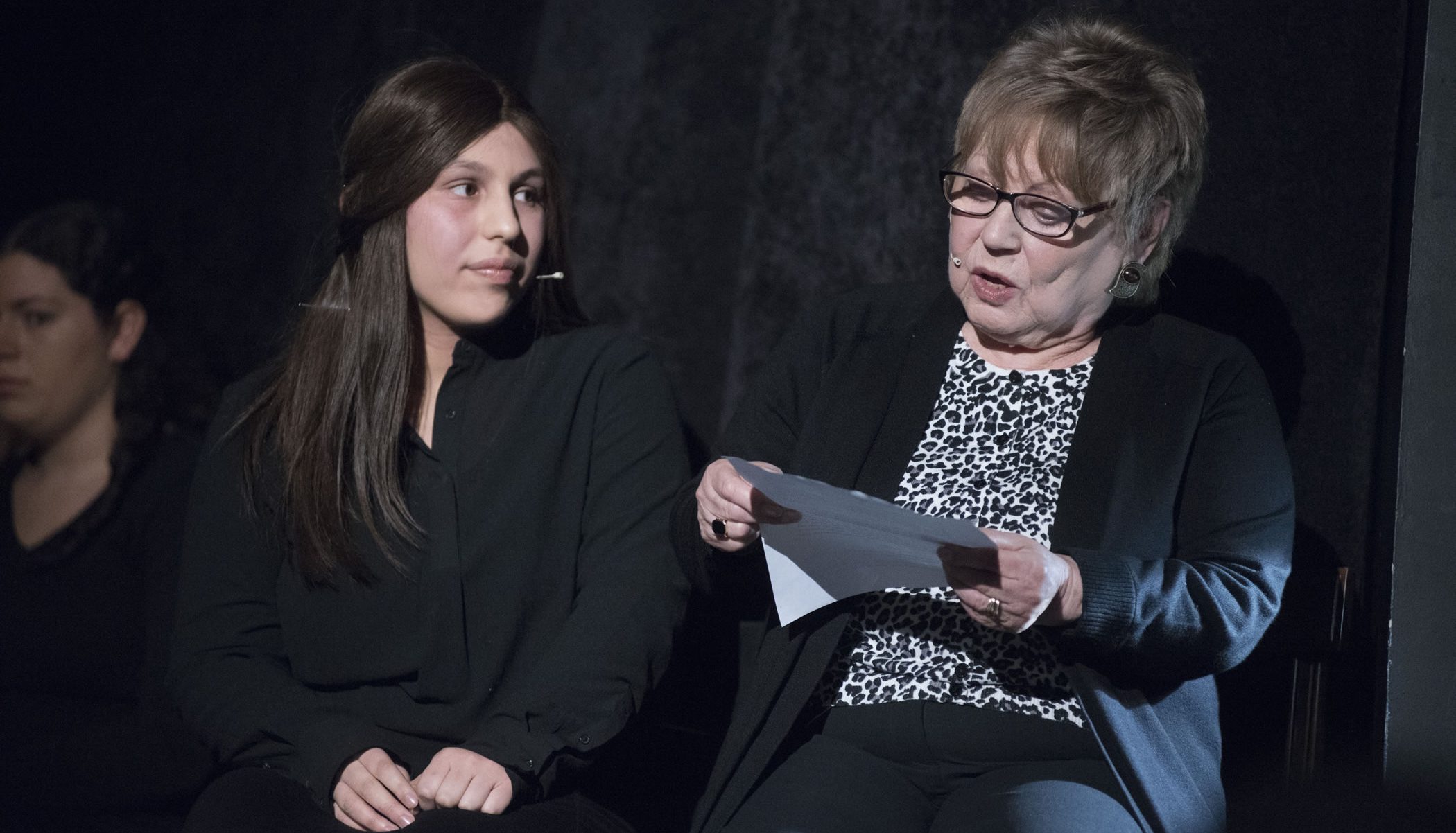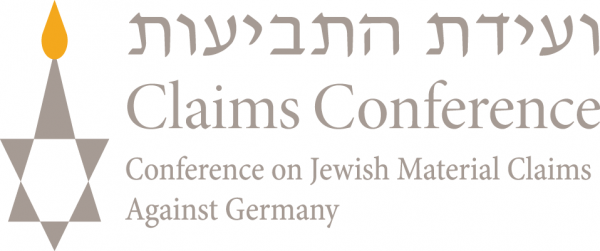High School Students Partner With Survivors to Re-Enact Their Stories

For a moment, Emily Knopf, a student at a Jewish high school in New York, was a young Adele Green, who grew up in Poland and witnessed the murder of several siblings during the Holocaust before she and sister went into hiding to survive the Nazi horror. Adele immigrated to the United States after the war, and now lives in New York City. This past school year, Emily and Adele connected in a unique drama program that educates high school students about the Holocaust and makes them ambassadors of its stories for future generations.
Linking these students and survivors is Witness Theater, which is in its fourth year in New York City, and now in five high schools. Since 2014, the Claims Conference has provided funding in support of this special program. Witness Theater originated in Israel and was brought to the United States in 2012 by Selfhelp Community Services, one of the largest agencies assisting survivors in New York City, and which is supported by the Claims Conference.

This was the second year that the Salanter Akiba Riverdale (SAR) High School participated in Witness Theater. The program is a huge time commitment for both students and the survivors, who volunteer their time. Starting last September, eight students and seven survivors met weekly. At first they had to learn to trust each other; later, the survivors told the stories of their lives and soon the students began to dramatize certain key moments. Each student took the role of a particular survivor, portraying that person in a short skit dramatizing several events in their life during the Holocaust.
The Witness Theater process and performance primarily serves to create a connection between the two generations and does not aim to be a professional dramatic experience for either group, said Eve Udetsky, the program’s liaison at Selfhelp.
“We don’t require the students to be interested in theater; some of them have never acted before,” Eve said. “This is more about the process. It is really focused on the stories rather than a complicated theatrical production.”

Doris Seeman, a child survivor from Germany, was smuggled into Belgium, but was captured and deported to France, where she spent time in several concentration camps. She was saved by the French children’s aid society OSE (Oeuvre de Secours Aux Enfants), which eventually sent her to a Catholic children’s home where she lived under false identity until liberation. She now lives in New York, and has spoken to students at SAR for many years. Other survivors who participated in the school’s Witness Theater program this year lived in hiding in Paris, were on the run in the woods in Belarus, and tried to escape Europe as a passenger on the infamous USS St. Louis.
The students reacted to the difficult Shoah testimony with respect, Doris said. “They showed a lot of kindness and sensitivity,” she said. “And I feel our history is safe in the hands of future generations of kids.”
Emily Knopf, a student at SAR High School and a Witness Theater performer, said she was surprised by the testimonies. “As a Holocaust program, I knew the stories of Witness Theater would be very tragic and difficult,” she said. “But I didn’t anticipate the caliber of courage, resilience, compassion, and other beautiful qualities that they held, too. I heard the worst of humankind and the best of humankind.”
Each Witness Theater program dramatizes the survivors’ stories in various ways. At this high school, the students and survivors were all dressed in black and sat in a semi-circle at the rear of the stage. Each adult was paired with a student, who would be portraying that survivor during the retelling of their Shoah story. All of the students acted in each 10-minute dramatic sketch, some portraying a parent or grandparent, a sibling, a Nazi. The survivors sat at the edge of the stage, and after each skit they picked up the thread of their lives and completed their stories.
Watching her life on the stage brought out tremendous emotions, Doris said. “I have been telling my story practically all my life since after the war,” she said. “I always get emotional, but not to the point when I cry. One day while we were rehearsing, I did not stop crying. They called me from Selfhelp the next day to see if I am OK. When I saw [my Shoah experience] being played out, it was like I saw again the day of Kristallnacht at home. I saw my pregnant mom, I saw my father, my brother.”
Emily said she is proud of her participation. “I realized how much of a gift it was to be able to present these amazing stories to hundreds of people,” she said. “The adults have carried their stories for so many years and finally passed them on to us. And now we’ve passed them on to so many others.”
The Claims Conference is proud to underwrite educational programs such as Witness Theater, creating eyewitnesses out of high school students who will carry this experience for the rest of their lives.

